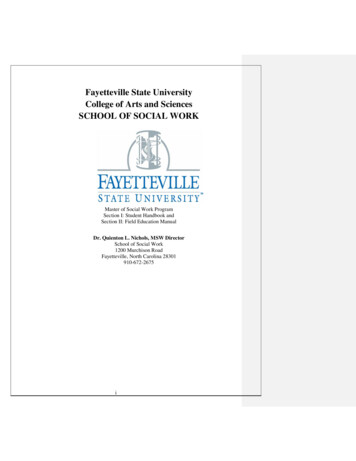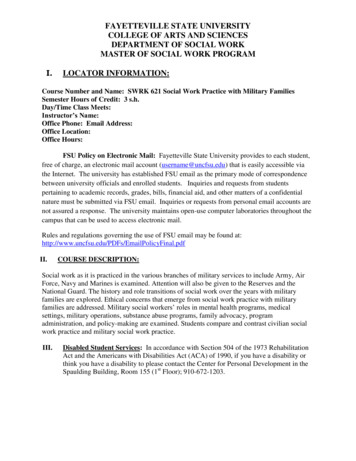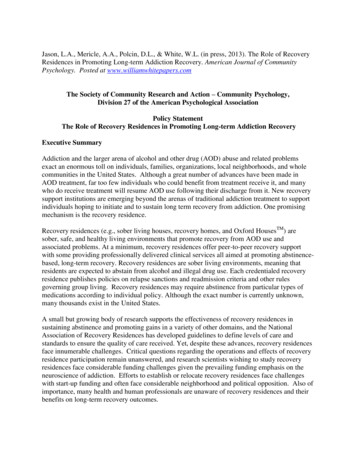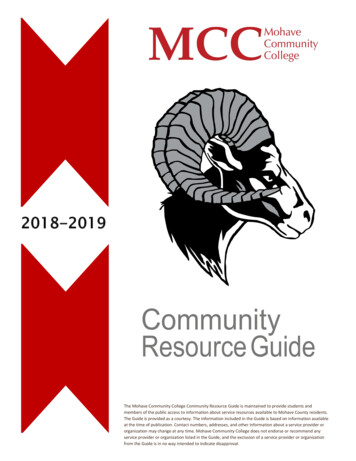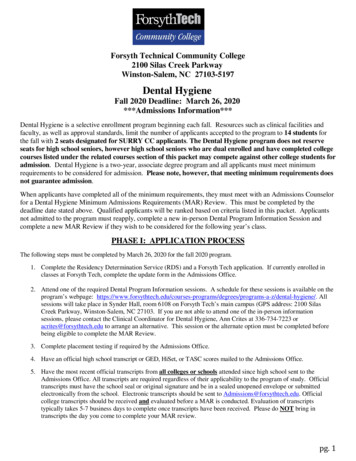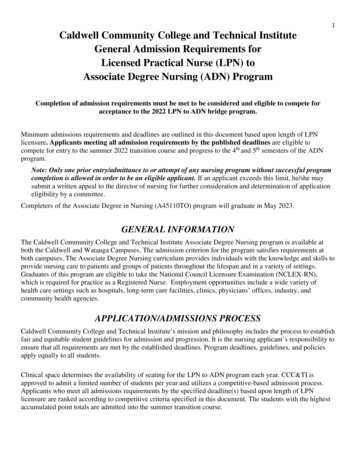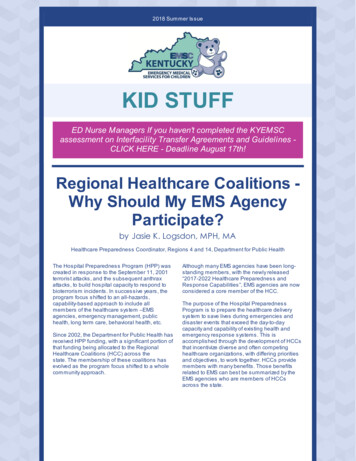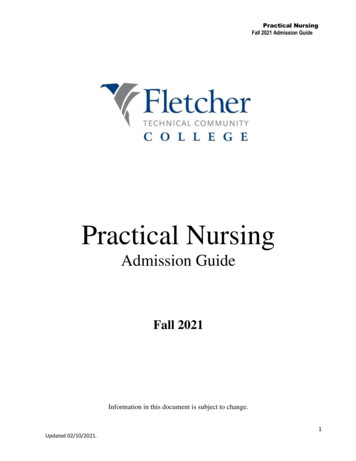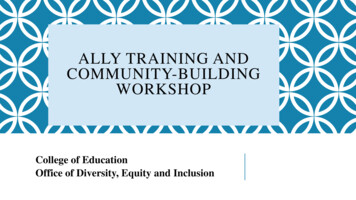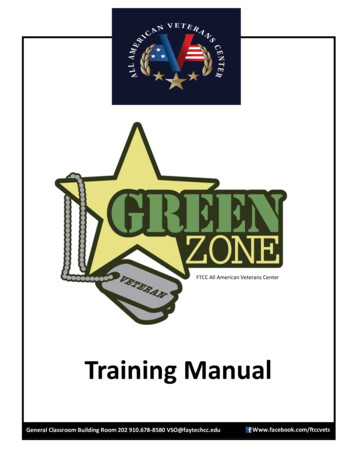
Transcription
FTCC All American Veterans CenterTraining ManualGeneral Classroom Building Room 202 910.678-8580 VSO@faytechcc.eduWww.facebook.com/ftccvets
Table of ContentsGreen Zone TrainingMission statement and Vision2What we do/Who we are/History3-5Military Terminology6What is Green Zone?7-8Who is a veteran?The Military Experience9-10Emotional Cycle of Deployment11-12Suicide Prevention13Transitioning14-15PTSD/TBI16-21What can I do?22Veterans want you to know 23Welcoming vets to campus24Privacy25VA Campus Toolkit resource26-31
MissionVeteran Services provides a seamless transition for student veterans bothacademically and socially by assisting them in becoming fully integrated intothe Fayetteville Technical Community College family by educating, preparing, and engaging. Veteran Services provides supportive services necessaryto ensure that student veterans are successful in their academic pursuits, adjust to the campus environment, and eventually transition to civilian employment.VisionFayetteville Tech is committed to easing the transition of service members tostudent veteran status by: Providing coordinated delivery of benefits and services. Conducting motivational and outreach workshops for veterans and collegefaculty/staff. Developing partnerships with campus and community personnel and resources. Providing professional counseling services to veterans via referral process to offcampus setting.2
What We DoFOR STUDENT VETERANS AND SERVICEMEMBERSWe help connect Servicemembers/Veterans and their families to the appropriate services on campus by providing the following: Information and resources to ease the transition from military-life to campus-life "Support the Student Veterans" Organization A friendly environment to meet with other veterans and assist in locatingon-campus and off-campus resources Veteran Success (ACA type) course in developmentFOR FACULTY AND STAFFWe connect faculty and staff to student veterans, service members and their familiesby providing the following: Green Zone Training - training to faculty and staff on information and resourcesrelated to issues faced by student veterans, service members & families Resources and information to help students with services needed inside and outside of the classroom A supportive environment where faculty and staff can seek assistanceresearch to understand best practices for student veterans3
Who We AreStudent Veteran ServicesMatt ThewesDirector,All American Veterans CenterDivision of Military and Veterans Programsthewesm@faytechcc.edu910.678.8296Charlene PierceJordonVeteran Services AssistantAll American Veterans Centerpiercecj@faytechcc.edu910.678.8267Sam McFaddenVeteran Services AssistantAll American Veterans Centermcfaddes@faytechcc.edu910.678-8395James KostVeteran Services AssistantAll American Veterans Centerkostj@faytechcc.edu910.678.8252FTCC Veteran Org.Mission: The FTCC Student Veterans purpose is to create a home for student veterans atFTCC; promote a sense of pride in past, present, or future duties through civic engagement, promote scholarship through educational empowerment, and provide for the needsof student veterans through social endeavors.Contact: SVA@faytechcc.eduMeetings: Second Thursday starting at 330pm Location Veteran Center dayroom.4
History of CenterAs our nation and our community scrutinize the current state of affairs in medical care forour vets, there is reason to take pride in other ways we have stepped up to better serve thosewho have bravely served our country. The GI Bill, passed at the conclusion of WWII and recognized as a pillar of support for our military veterans, continues to secure a brighter futurefor those returning from service in Afghanistan, Iraq and elsewhere. Indeed, on September11, 2012, in a rare exhibit of bipartisan equanimity, the House of Representatives passed anew law that strengthened the GI Bill and our promises to American vets. HB 4057 required the VA to implement policies assuring veterans are making well-informed decisionsabout their choices in pursuit of higher education and post-service job training. Importantly,the bill also required states to consider and value certain military training when grantinglicensing and credentialing in various occupations.With more than a million troops returning and transitioning to civilian life, especially in anuncertain economy, it is critical that our nation’s channels to higher education and job training stand ready to put our veterans to work.Here at Fayetteville Tech, no fewer than 4,000 veterans have enrolled since 2012. That’s thehighest veteran enrollment in North Carolina. Military Times has also ranked FTCC as second highest on their list of Best for Vets for Career and Technical Colleges in 2014. This enrollment and our ranking reflect one thing: the thought and effort FTCC is putting into tailoring programs and policies around veterans and their unique experiences.The All American Veterans Center is essential in supporting veterans as they transition tobeing successful students and employed graduates. And, it serves as a model organization toother campuses as they, too, seek to support our returning and retiring military personnel.To date, the All American Veterans Center has had over 5000 students and visitors walkthrough its doors.5
Military TerminologyService member - generic term which encompasses Active Duty, National Guard and Reserve component personnel of the Army, Air Force,Navy, Marines and Coast Guard.Veteran - any individual who served in the U.S.military regardless of length, time, and/or locationof serviceOEF - Operation Enduring Freedom; war engagement in AfghanistanOIF - Operation Iraqi Freedom; war engagement in IraqDependents - a child or spouse of a veteran or service memberPTSD - Post Traumatic Stress DisorderTBI - Traumatic Brain InjuryIED - Improvised Explosive Device; VBIED - Vehicle Borne Improvised Explosive DeviceFOB - Forward Operating BaseMOS - Military Occupational Specialty; a service member’s job while in the militaryHooah/Hoorah/Oorah - A phrase used for many different reasons; can be used to show excitement and to identify that you understand an order or command and will comply.“ate-up” - used to negatively describe a situation in which a person feels like things are notgoing well or to describe someone with no military bearing.Roger - denotes understanding or compliance; military version of “okay”.6
Green Zone TrainingGreen Zone.What is it? An initiative to support student veterans by designating locations recognized as a “safeplace”. Identifies faculty and staff throughout Fayetteville Tech who are knowledgeable aboutissues faced by student veterans and the resources available to assist them. Participants are identified by a Green Zone emblem located outside their office doorand on their syllabus. Is not only a Professional Development opportunity but also a way to be supportive tothose who have sacrificed for others. Helps faculty and staff provide supportive services necessary to ensure that veteranstudents are successful in their academic pursuits, adjust to the campus environment,and eventually transition to civilian employment.Who is a Green Zone volunteer? FTCC staff and faculty who identify themselves as:- someone who is aware of the issues and concerns faced by student veterans/servicemembers- someone who is available to assist the student- someone who has completed the Green Zone training Volunteers are NOT expected to be experts who can “solve” the problems; Instead—- lend a sympathetic ear- be someone who can help the student find the appropriate resources for problemresolution7
Green Zone TrainingWho is a Student Veteran/Servicemember?Student veterans are a diverse group of individuals. Theyare: From all branches of the military Range in age, race/ethnicity and gender Have served during times of war and peace More likely to have familiesStudent Veterans and Service members at FTCCWe have identified that there are:700 Active Military students2050 Veteran studentsOf those students, the top majors for veterans or service members at FTCC are:Associate in General Education: 25%Associate in Arts: 7%Criminal Justice Technology: 5%Associate in Science: 4%Business Administration: 4%8
Green Zone TrainingMilitary Experiences Military culture and battlefield skills can be deeply internalizedby many service members. Sometimes, core beliefs and principles learned through military service can conflict with the beliefsand principles underlying higher education. For example, following orders and respecting rank and formality may run counter toindependent thinking and informality encouraged in many classrooms.9
Green Zone TrainingThe Military ExperienceIn North Carolina:50,886 troops have deployed to OIF/OEF since 9/11*There are more than 743,377 veterans living in North Carolina**There are 100,000 Active Duty N.C. residents*The Military Experience and Deployments are characterized by the following: Separation from family or loved ones- Most are leaving home for the first time- Separation from extended family and close friends- Separation from boyfriends and girlfriends Relocate away from family and friends- May be assigned to a base in a different part of the country- Adjustments to new climates and culture Deployments last from 6-18 months Multiple deployments- Some serve more than one deployment before being discharged from the military- More than 977,500 have experienced 2 or more deployments Emotional Cycle of Deployment:- Pre-deployment, Deployment, Sustainment, Re-deployment, Post-deployment* U.S. Census Bureau, 30 Sept 2010** Defense Manpower Data Center, 29 July 201210
Green Zone TrainingEmotional Cycle of Deployment** Franklin, 200911
Green Zone TrainingSuggested ntalhealth.orgEmotional Cycle of DeploymentFamily Members/DependentsFamily members or dependents of Veterans/Service members may also need support. They could be experiencing any of the following:12 Separation from a loved one Difficulty concentrating Difficulty transitioning Difficulty adjusting to role changes Loss or injuries of a loved one
Green Zone TrainingSuicide Prevention ProgramUnder the Army’s initiative to decrease suicide amongst the ranks, Soldiersare taught to “Ask, Care, and Escort” anyone who mentions suicide.- Usher to a Behavioral Health Care provider, chaplain, or PrimaryCare Provider- Never leave a friend alone- Lifeline: 1-800-273-TALKEncourage your Veteran students to seek help. Seeking help is a sign ofcourage.The following feelings and behaviors can all be signs for concern. It is important toseek professional guidance right away if a veteran is: Thinking about hurting or killing him or herself Talking or writing about death, dying or suicide Unable to sleep or oversleeping Withdrawing from friends, family or society Increasing alcohol or drug use Engaging in reckless or risky behavior Experiencing excessive rage, anger or desire for revenge Having feelings of anxiety, agitation or hopelessness Reliving past stressful experiences Experiencing dramatic changes in mood13
Green Zone TrainingTransitioning: Service to Student, Base to CampusTransition StrengthsVeterans and Service members who transition out of the military onto collegecampuses bring a unique perspective with them. Military training Life experience Established identity World viewThere are also certain skills taught in the military tohelp students be successful. Leadership Motivation Time Management Work Ethic Stress ManagementTransition DifficultiesThere are a number of issues that may arise that affect the transition process forVeterans and Service members and could become a barrier to success.14 Difficulty translating their military skills into a new profession Difficulty switching gear with a new focus that is unrelated to militaryexperience Military skills & training may not translate into college credits Universities may have difficulty deciphering transfer credits for thosewho have started and stopped higher education at multiple institutions
Green Zone TrainingTransition Difficulties cont. Difficulty using the G.I. Bill- Late fees due to late payments of VA Benefits- Late payment can prevent them from registering for classes, applyingfor graduation, and receiving transcripts Being an older student, possibly with a family to care for Living off campus Alienation Insensitivity of classmates, faculty and others on campus in regards to discussion of war and militaryThings to keep in mind about Student Veterans in the classroom.They may: Have difficulty relating to classmates Find loud noises to be disturbing Become anxious with changes in the classroom Have excessive absences Have PTSD or TBI15
Green Zone TrainingPost-Traumatic Stress Disorder (PTSD)PTSD occurs after and individual has seen or experienced a traumatic event that involved injury, the threat of injury or death. PTSD is experienced by some, but not allstudent veterans and service members. It is beneficial to have some knowledge ofPTSD and its’ symptoms but not to expect that every student veteran will displaythem. Although many student veterans may have stressful or traumatic experiencesnot all develop PTSD.PTSD Symptoms: Repeated “re-living” of the event which disturbs day-to-day activity- Flashback episodes where the eventseems to be happening again and again Avoidance/Numbing- Avoiding people and places thatremind you of a trauma. Emotional“numbing” or feeling as though you donot care about anything Hyper-arousal- Excessive awareness (hyper-vigilance).Feeling keyed up, irritable or angry andconstantly on guard. Difficulty concentrating and falling/staying asleep.PTSD in the ClassroomStudent Veterans may:16 Sit in the back of the classroomso they can have a clear viewof everything around them Be withdrawn from class discussion Be easily startled by noises (pensdropping, shuffling in a backpack,whispering or other noises from classmates) Have difficulty maintaining emotional control during difficult topics
Green Zone TrainingTraumatic Brain Injury(TBI)A TBI can result from a blow or jolt to the heador a penetrating head injury that disrupts thefunction of the brain. The severity of the injurycan vary from mild to severe. With a mild TBIthere is a brief change in mental status or consciousness. A severe TBI results in an extendedperiod of unconsciousness and possibly amnesiaafter the injury.Combat experience is one of the main risk factors for sustaining a TBI. Combatants are exposed to blasts from explosions and roadside bombs.Improvements have been made to body armor and helmets to prevent the occurrence of aTBI. The likelihood of surviving blasts has increased as a result of sophisticated equipment, unlike in previous wars.TBIs often go undiagnosed because symptoms may not appear until weeks later. It is especially difficult for strangers to detect changes in a service member’s emotional health andpersonality. Can often be hard to distinguish and identify between PTSD and a TBI because both share overlapping symptoms.17
Green Zone TrainingTBI Symptoms Cognition Mood- Motor Sensory Disturbances-Apathy/Depression- Impairments in:- Anxiety- IrritabilityLanguage- Emotional LiabilityCommunication- InsensitivityAttention- EgocentricityConcentrationMemoryLearning new informationSpeed of information processingJudgmentDecision makingProblem solvingInsight Behavior- Lack of initiation- Lack of inhibition- Impulsivity- Emotional Liability- Restlessness- Aggression- AgitationOther wounds of war:Spinal Cord Injury (SCI) - A spinal cord injury occurs when trauma or disease damages the spinal cord and results in partial or complete paralysis.Military Sexual Trauma (MST) - Includes sexual assault, sexual threats,bullying, and unwanted touching or grabbing that occurred while in the military.18
Green Zone TrainingInvisible WoundsUp to 1/3 of student veterans may be struggling with “invisiblewounds” of war: traumatic brain injury, post-traumatic stressdisorder or major depression. These conditions can impactschool performance. All three “invisible wounds” can impactthe ability to concentrate and complete assignments.19
Green Zone TrainingVA National Center for PTSD Websitewww.ptsd.va.govFact sheets, videos, web resource links, and more.Faculty ResourcesReturning from the War Zone guides-rwz.aspFull color PDFs in versions for Military personnel and families with narratives. Includes a Flash interactive multimedia presentationUnderstanding d-overview.aspLearn what PTSD is, and what it is not. Hear real stories of people dealing with PTSD. Includes aninteractive online format as well as a full color PDF handout.VA PTSD Program help.aspFind a VA PTSD treatment program near you.After Deployment:www.afterdeployment.orgWellness resources for the military community.Student ResourcesMilitary OneSource:www.militaryonesource.comFree service provided by the Department of Defense for active-duty, Guard, and Reserve ServiceMembers and their families, topics include education, relocation, parenting, stress.National Resource Directory:www.nationalresourcedirectory.orgOver 11,000 resources for wounded, ill or injured Service Members and their family.Real Warriors:www.realwarriors.netPromotes the processes of building resilience, facilitating recovery and supporting reintegration ofreturning Service Members, Veterans and their familiesReturning Service Members:www.oefoif.va.govStudent Veterans of America:www.studentveterans.orgNational organization that helps develop student Veteran groups on campuses and develop programsand policies to assist with Veteran transition to the classroom.20
Green Zone TrainingConsidering the Needs of StudentVeterans with Disabilities.It is estimated that 23%-31% of veterans of OIF/OEFhave PTSD symptoms and 20% have mild TBIs.Some of these vets are coming to our campus.Student veterans may be experiencing these orany disabilities for the first time. They maybe unaware of services on campusfor people with an identified disability.Veterans may also not want to self identifyas having a disability. They may not want to disclose problems because of social stigma. Identification of a disability may have implications for future in the military forthose who are still active service members or those who are seeking to go back into military service after school.What Green Zone volunteers should know:Do not ask or suggest that the student veteran/service member has a disabilitybut instead inquire about the issues he/she is experiencing to better provide the appropriate resources.Students may need extra help navigating the system and understandingwhat help is available. Provide the student with contact info for the FTCC veteransoffice, if requested where we will assist the student in making an appointment, if needed.21
Green Zone TrainingEasing the Transition.What can I do?Have an open dialogue with student veterans about their frustrations. Discuss careergoals and where they would like their future to go. Provide them with information aboutvarious service and resources available as it seems appropriate. Student Veteran Services Veteran certification (Through the veterancenter) Job Center Disability Support Services Office VA Hospital Wounded Warrior ProjectQuestions to Ask: What was your branch of service? How long were you in the military? How has your experience been at school? How are you and your family doing?Do not ask if they have killed someone orhow they were injured!Many students are seeking validation, butsaying, “Thank you for your service” isn’tsomething they want to hear. They justwant you to show you care about their wellbeing and they are valued.
Mission: The FTCC Student Veterans purpose is to create a home for student veterans at FTCC; promote a sense of pride in past, present, or future duties through civic engage-ment, promote scholarship through educational empowerment, and provide for the needs of student veterans
